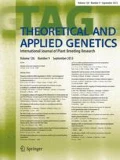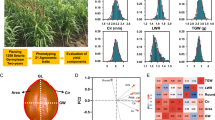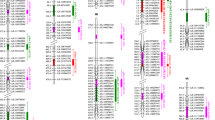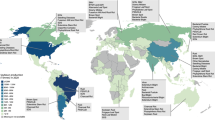Abstract.
Rice (Oryza sativa) cultivar development currently faces the task of overcoming yield plateaus, which is difficult due to the narrow genetic base of breeding programs. Oryza glumaepatula is a diploid wild relative of cultivated rice, native to Central and South America, and is therefore a potential source of alleles of agronomic importance to rice breeding programs. We studied 11 agronomic traits in BC2F2 families of the interspecific cross Oryza sativa × O. glumaepatula. Transgressive lines which are almost isogenic to the elite recurrent O. sativa parent were identified for most of these traits. Quantitative trait locus (QTL) analysis was performed by single-point and interval mapping using a molecular map based on 157 microsatellite and STS markers. Marker regions accounting for 14.5 to 72.9% of a phenotypic variation trait were identified in 9 of the 12 rice chromosomes. Positive QTL effects from O. glumaepatula were observed in chromosomal regions associated with tillering and panicle-number traits.
Similar content being viewed by others
Author information
Authors and Affiliations
Additional information
Electronic Publication
Rights and permissions
About this article
Cite this article
Brondani, .C., Rangel, .P., Brondani, .R. et al. QTL mapping and introgression of yield-related traits from Oryza glumaepatula to cultivated rice (Oryza sativa) using microsatellite markers. Theor Appl Genet 104, 1192–1203 (2002). https://doi.org/10.1007/s00122-002-0869-5
Received:
Accepted:
Issue Date:
DOI: https://doi.org/10.1007/s00122-002-0869-5




